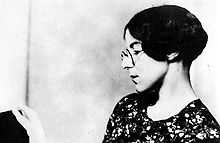Sylvia Townsend Warner
| Sylvia Townsend Warner | |
|---|---|
 | |
| Born |
Sylvia Nora Townsend Warner 6 December 1893 Harrow on the Hill, Middlesex, England, UK |
| Died | 1 May 1978 (aged 84) |
| Occupation | Writer |
| Genres | Novel, poetry |
Sylvia Townsend Warner (6 December 1893 – 1 May 1978) was an English novelist and poet.
Life
Sylvia Nora Townsend Warner was born at Harrow on the Hill, Middlesex, the only child of George Townsend Warner and his wife Eleanora (née Hudleston). Her father was a house-master at Harrow School and was, for many years, associated with the prestigious Harrow History Prize which was renamed the Townsend Warner History Prize in his honour, after his death in 1916. As a child, she enjoyed a seemingly idyllic childhood in rural Devonshire, but was strongly affected by her father's death. She moved to London and worked in a munitions factory at the outbreak of World War I.[1]
Warner was friendly with a number of the "Bright Young People" of the 1920s. Her first major success was the novel Lolly Willowes. In 1923, she met T. F. Powys, whose writing influenced her own and whose work she in turn encouraged. It was at Powys' home that Warner, in 1930, first met Valentine Ackland, a young poet; the two women fell in love and settled at Frome Vauchurch, Dorset.[1] Alarmed by the growing threat of fascism, they were active in the Communist Party of Great Britain, and visited Spain on behalf of the Red Cross during the Civil War. They lived together from 1930 until Ackland's death in 1969. Warner's political engagement continued for the rest of her life, even after she became disillusioned with communism. [citation needed]
Work
Early in her career Warner researched 15th and 16th century music, and spent a decade as one of the editors of the substantial Tudor Church Music, published by Oxford University Press. In 1934 she published a joint collection of poems with Ackland, Whether a Dove or a Seagull. She was encouraged to write fiction by David Garnett.[2] Warner's novels included Lolly Willowes (1926), Mr Fortune's Maggot (1927), Summer Will Show (1936), and The Corner That Held Them (1948).[3] Recurring themes are evident in a number of her works. These include a rejection of Christianity (in Mr Fortune's Maggot, and in Lolly Willowes, where the protagonist becomes a witch); the position of women in patriarchal societies (Lolly Willowes, Summer Will Show, The Corner that Held Them); ambiguous sexuality, or bisexuality (Lolly Willowes, Mr Fortune's Maggot, Summer Will Show); and lyrical descriptions of landscape. [citation needed]
Warner's short stories include the collections A Moral Ending and Other Stories, The Salutation, More Joy in Heaven, The Cat's Cradle Book, A Garland of Straw, The Museum of Cheats. Winter in the Air, A Spirit Rises, A Stranger with a Bag, The Innocent and the Guilty, and One Thing Leading to Another. Her final work was a series of linked short stories set in the supernatural Kingdoms of Elfin.[3] Many of these stories were published in The New Yorker.[1] In addition to fiction, Warner wrote anti-fascist articles for such leftist publications as Time and Tide and Left Review.[2] Warner published a biography of the novelist T.H. White, which The New York Times declared "a small masterpiece which may well be read long after the writings of its subject have been forgotten."[4]
Although Warner never wrote an autobiography, Scenes of Childhood was compiled after her death on 1 May 1978 at age 84, based on short reminiscences published over the years in the New Yorker. She also translated Contre Saint-Beuve by Marcel Proust from the original French into English. In the 1970s, she became known as a significant writer of feminist or lesbian sentiment, and her novels were among the earlier ones to be revived by Virago Press. Selected letters of Warner and Valentine Ackland have been published twice: Wendy Mulford edited a collection titled This Narrow Place in 1988, and ten years later Susanna Pinney published another selection, Jealousy in Connecticut. [citation needed]
Novels
- Lolly Willowes (1926)
- Mr Fortune's Maggot (1927)
- The True Heart (1929)
- Summer Will Show (1936)
- After the Death of Don Juan (1938)
- The Corner That Held Them (1948)
- The Flint Anchor (1954) (vt The Barnards of Loseby, 1974)
Poetry collections
- New Collected Poems (Carcanet Press, 2008)
- Selected Poems Carcanet Press, 1985)
References
- ↑ 1.0 1.1 1.2 Dinnage, Rosemary. An Affair to Remember (review of I'll Stand By You: Selected Letters of Sylvia Townsend Warner and Valentine Ackland). New York Times, 7 March 1999; retrieved 4 January 2013.
- ↑ 2.0 2.1 Jane Dowson. Women's Poetry of the 1930s: A Critical Anthology. Routledge, 1996; ISBN 0415130956 (pp 149-58).
- ↑ 3.0 3.1 Darrell Schweitzer, "Warner, Sylvia Townsend", [sic] in St. James Guide To Fantasy Writers, edited by David Pringle. St. James Press, 1996; ISBN 1-55862-205-5 (pp 589-90).
- ↑ Allen, Walter. "Lucky In Art Unlucky In Life" (fee required), The New York Times, 21 April 1968; retrieved 10 February 2008.
Further reading
- Harman, Claire (1989) Sylvia Townsend Warner: A Biography. Chatto & Windus
- Pinney, Susanna (1998) I'll Stand by You: Selected Letters of Sylvia Townsend Warner and Valentine Ackland with narrative by Sylvia Townsend Warner. North Pomfret, Vt.: Pimlico/Trafalgar Square; ISBN 0-7126-7371-7
- Mulford, Wendy (1988) This Narrow Place: Sylvia Townsend Warner and Valentine Ackland 1930-1951
External links
- The Sylvia Townsend Warner Society
- The Sylvia Townsend Warner Archive, Dorset County Museum, UK
- Review of An Affair to Remember, New York Times, 7 March 1999
|